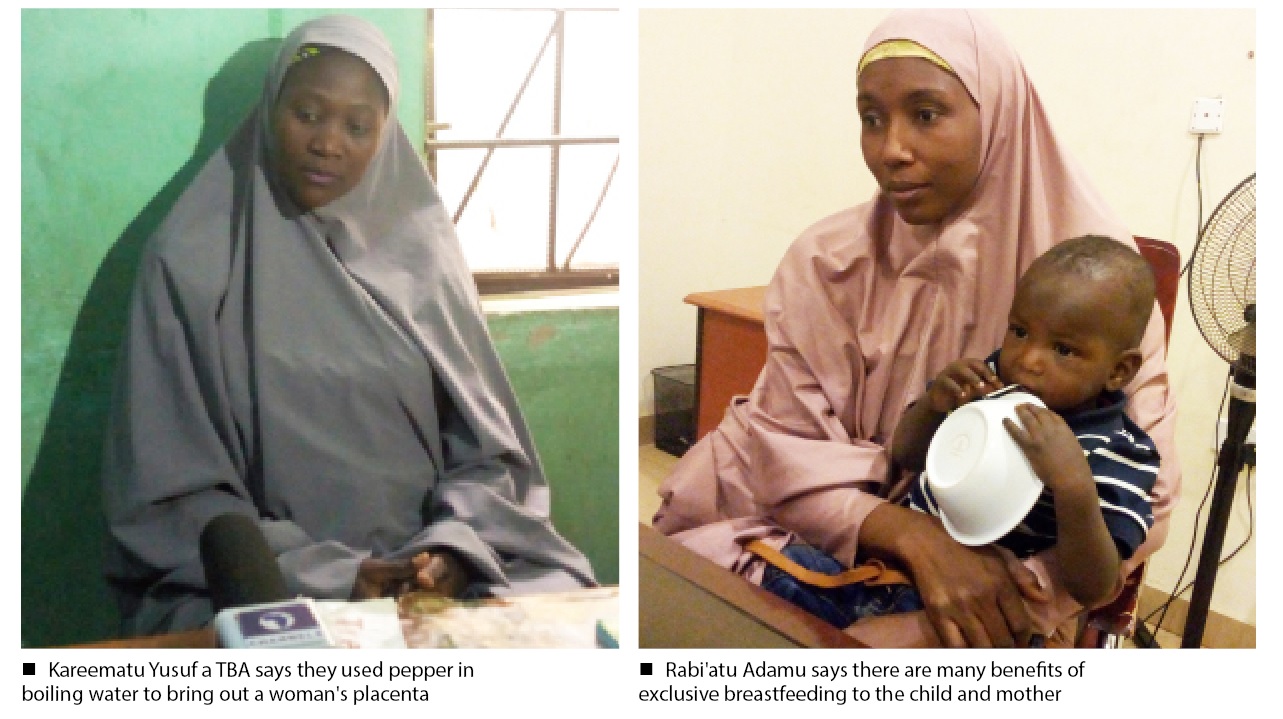How birth attendants, religious leaders embraced exclusive breastfeeding in Kaduna
For years, the campaign has been on to create awareness about exclusive breastfeeding. One of the key groups targeted by the campaigns are traditional birth attendants who recently in Kaduna embraced the campaign to improve childcare as our correspondent reports. For Kareematu Yusuf, one of her tools as a good midwife or Traditional Birth Attendant, […]

For years, the campaign has been on to create awareness about exclusive breastfeeding. One of the key groups targeted by the campaigns are traditional birth attendants who recently in Kaduna embraced the campaign to improve childcare as our correspondent reports.
For Kareematu Yusuf, one of her tools as a good midwife or Traditional Birth Attendant, TBA, was her nose. When a woman was in labour, she used to sniff for the scent of blood to confirm that the child is indeed coming. That would be her cue to set a pot on fire for hot water to bath the newborn.
“While that is going on, when we notice that the placenta is still in the womb, we sprinkle pepper in boiling water, causing the woman who just gave birth to sneeze,” she said. “Because we thought when we do that, the placenta will come out. Or we try to make her throw up so that she compresses her uterus and the placenta comes out.”
For centuries, this tested methods have worked for these women known as Unguwon Zoma but the TBA are now learning that there are better and safer ways of carrying out their practice. And their roles in not only birthing healthy babies but raising healthy babies is one that an organisation, Alive and Thrive, has taken seriously.
Recently, the organisation organised training for the women and religious leaders in Kaduna to encourage them to embrace six month exclusive breastfeeding.
“Today, we are better informed and enlightened,” Kareema said. “When we receive delivery at home, immediately the baby comes out of its mother’s womb, we quickly place it on the mother’s stomach and it begins to suckle and while that is going on, the placenta comes out on its own.”
She said that was one of the things that they learned during the training, which has changed her perspective on her work.
“We discovered also that when the baby is placed on its mother’s breast to suckle, the woman is less at risk of heavy bleeding,” she said.
Some of the benefits of exclusive breast-feeding that convinced her was when a child is given exclusive breastfeeding for the first 1000 days of its life, it improves the child’s health as compared to others who have not been on the plan.
This, she said, has made her a champion for exclusive breastfeeding in her engagement with local women in various communities where she stresses the importance of antenatal clinics, adhering strictly to prescribed medication counselling and also giving birth at hospitals.
Maryam Mohammed and Hajara Abdullahi, who are also TBA’s in Badarawa, Kaduna North Local Government Area, corroborated Kareema’s story. For them, the challenge with their patients is the disparity between those who attend private hospitals and those who attend public ones, who, they said are not well informed on the many benefits of exclusive breastfeeding.
But even for them, the difference between exclusively breastfed babies and the others is quite noticeable.
Chairman, Christian Association of Nigeria (CAN), Rigasa District, Sunday Waman said the programme is a welcome development because they have educated their followers on how to raise children through exclusive breast feeding for six months and how to give the children nourishing food after the six months.
“I have been going from house to house to educate people because of the advantage it has for child growth. Exclusive breast feeding and proper complimentary feeding make the child’s brain grow well,” he said.
He lamented that the prevailing insecurity has made it impossible for the church to spread the knowledge to distance locations.
Similarly, an Islamic cleric, Imam Habib Muhammad Zangina, said the programme is a success within the predominantly Muslim community of Rigasa and they have continued to enlighten their congregation especially after every prayer.
“The first breast milk that a mother gives to her child is full of cholesterol which is very good and beneficial for a baby at birth and so we preach to our congregation,” he said.
Both Waman and Mohammed said their summons on exclusive breastfeeding and good diet were usually backed by quotes from the Bible and Qur’an, and also focused on discouraging harmful cultural and traditional practices that have negative impacts on the growth and development of children.
Also, a Fulani leader in Kangimi, Mohammed Kagimi, expressed appreciation to Alive & Thrive for educating them on the importance of Infant and Young Child Feeding (IYCF).
“We are now applying it and it is giving us positive results. Presently there are no much cases of constant illness from our children,” he said.
Kangimi, however, urged the organisation to sustain the enlightenment campaign, to ensure that those still sceptical about exclusive breastfeeding embrace it wholeheartedly.
A nurse at Jowako hospital, Mrs. Victoria Alabi, who is a stakeholder in the intervention being carried out by the group, explained that the organisation had helped health personnel at the clinic with more skills and deepened their knowledge on how to counsel mothers on exclusive breastfeeding.
